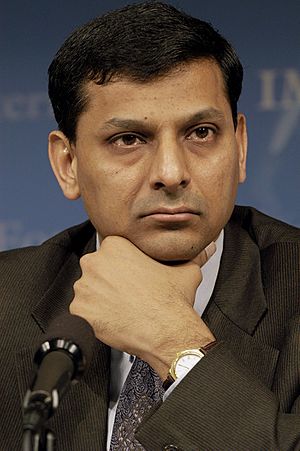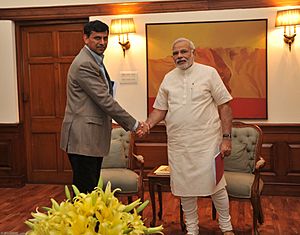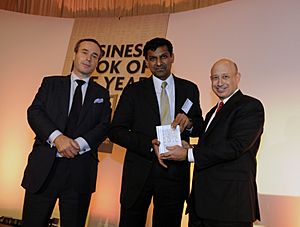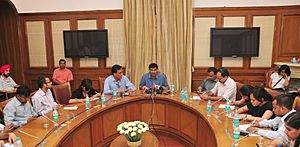Raghuram Rajan facts for kids
Quick facts for kids
Raghuram Rajan
|
|
|---|---|

Rajan in 2004
|
|
| 23rd Governor of the Reserve Bank of India | |
| In office 4 September 2013 – 4 September 2016 |
|
| Prime Minister | Manmohan Singh Narendra Modi |
| Preceded by | Duvvuri Subbarao |
| Succeeded by | Urjit Patel |
| 15th Chief Economic Adviser to the Government of India | |
| In office 10 August 2012 – 4 September 2013 |
|
| Prime Minister | Manmohan Singh |
| Preceded by | Kaushik Basu |
| Succeeded by | Arvind Subramanian |
| 7th Chief Economist of the International Monetary Fund | |
| In office 1 September 2003 – 1 January 2007 |
|
| Preceded by | Kenneth Rogoff |
| Succeeded by | Simon Johnson |
| Personal details | |
| Born | 3 February 1963 Bhopal, Madhya Pradesh, India |
| Spouse | Radhika Puri |
| Education | Campion School Bhopal
Delhi Public School, R. K. Puram Indian Institute of Technology, Delhi (BTech)Indian Institute of Management, Ahmedabad (PGDM) Massachusetts Institute of Technology (PhD) |
| Signature | |
Raghuram Govind Rajan (born 3 February 1963) is a famous Indian economist. He is currently a distinguished professor of finance at the University of Chicago's Booth School of Business.
Rajan held important roles in global finance. He was the Chief Economist of the International Monetary Fund (IMF) from 2003 to 2006. Later, he served as the 23rd Governor of the Reserve Bank of India from 2013 to 2016. In 2015, he also became the Vice-Chairman of the Bank for International Settlements.
Raghuram Rajan is well-known for predicting the 2008 financial crisis. In 2005, he warned about growing risks in the financial system. Many people, including former U.S. Treasury Secretary Lawrence Summers, did not agree with him at the time. However, after the crisis happened, his warnings were seen as very accurate. He was even interviewed for the documentary Inside Job.
He has received several awards for his work. In 2003, he won the first Fischer Black Prize. This award is given to financial economists under 40 who have made big contributions. His book, Fault Lines: How Hidden Fractures Still Threaten the World Economy, won a major business book award in 2010. In 2016, Time magazine included him in its list of the '100 Most Influential People in the World'.
Contents
Early Life and Education
Raghuram Rajan was born on 3 February 1963 in Bhopal, India. His father worked for the Indian government's intelligence agencies. Because of his father's job, Rajan's family lived in different countries like Indonesia, Sri Lanka, and Belgium during his childhood.
The family returned to India in 1974. Rajan attended Campion School, Bhopal and later Delhi Public School, R. K. Puram.
Higher Education and Early Career
In 1981, Rajan began studying electrical engineering at the Indian Institute of Technology Delhi. He was a top student and graduated in 1985. He then earned a Post Graduate Diploma in Management (like an MBA) from the Indian Institute of Management Ahmedabad in 1987.
After a short time working, he decided to pursue further studies. He joined the doctoral program at the Massachusetts Institute of Technology. In 1991, he earned his PhD for his research on banking. His work explored how financial systems were changing and how banks interacted with businesses.
He has also received honorary doctorate degrees from several universities around the world.
Career Highlights
Academic Contributions
In 1991, Rajan became a professor of finance at the University of Chicago's Booth School of Business. He became a full professor in 1995. He has also taught as a visiting professor at other well-known business schools.
Rajan has written many articles and books about banking, company finance, and how economies grow. He often writes for Project Syndicate, sharing his economic ideas. He has worked with other economists like Douglas Diamond and Luigi Zingales. Their research often focuses on how financial markets affect economic growth.
His 2003 book, Saving Capitalism from the Capitalists, argued that open financial markets help economies grow and create opportunities. His 2010 book, Fault Lines: How Hidden Fractures Still Threaten the World Economy, looked at the problems that led to the 2008 financial crisis. He suggested that issues like income inequality and trade imbalances played a role. This book won the Financial Times and McKinsey Business Book of the Year Award.
Experts rank him among the world's most influential economists. He received the Fischer Black Prize in 2003 for his important work on financial institutions. He was also the president of the American Finance Association in 2011.
Role at the International Monetary Fund
After the 1997 Asian financial crisis, the International Monetary Fund (IMF) faced criticism. The IMF helps countries with their economies. In 2003, Rajan was appointed as the Chief Economist of the IMF. He was the youngest person and the first from an emerging country to hold this position. He served from October 2003 to December 2006.
At the IMF, Rajan helped to include financial analysis more deeply into the IMF's economic models for countries. He also worked on ways to help major economies reduce their trade imbalances. His department researched how countries like China and India were growing and becoming part of the global economy. He also published research that sometimes challenged common ideas at the IMF, for example, questioning how effective foreign aid was.
Economic Advisor to the Indian Government
In 2007, Rajan was asked to write a report on financial sector reforms in India. He led a committee that suggested many small steps to improve India's financial system.
In 2008, he became an honorary economic adviser to the Indian Prime Minister. On 10 August 2012, he was appointed as the Chief Economic Adviser to the Government of India. In this role, he prepared the Economic Survey of India for 2012–13. He advised the government to reduce spending and encourage people to move from agriculture to other skilled jobs.
Governor of the Reserve Bank of India
On 6 August 2013, it was announced that Raghuram Rajan would become the Governor of the Reserve Bank of India (RBI). He took charge as the 23rd governor on 5 September 2013. The RBI is India's central bank, similar to the Federal Reserve in the US.

As RBI Governor, Rajan focused on controlling inflation (when prices rise). He successfully brought down retail inflation significantly. He also made the RBI use the consumer price index (CPI) as the main measure for inflation, which is a global standard. India's foreign exchange reserves also grew a lot during his time.
Under Rajan, the RBI allowed new types of banks to open. This helped extend banking services to more people in India. He also made credit card transactions safer by requiring two-factor authentication.
In May 2016, some politicians made accusations against Rajan, claiming he was harming small businesses by raising interest rates. Rajan stated these claims were false.
On 18 June 2016, Rajan announced he would not serve a second term as RBI Governor. He returned to his academic work at the University of Chicago. He later explained that the government did not offer him an extension.
Economic Views
Raghuram Rajan believes that financial markets should play a bigger role in the economy. In his book Saving Capitalism from the Capitalists, he argues that free financial markets help create wealth and opportunities for everyone, including the poor.
He is known for his warning about the 2008 financial crisis. In 2005, he pointed out that financial managers were taking too many risks. He said these risks could lead to big problems for the economy. After the crisis, his views were widely recognized as correct.
Rajan has also discussed how to improve economies. He believes that countries should fix underlying problems like workforce competitiveness. He suggests educating workers and encouraging new businesses.
He has also spoken about the importance of democracy for India's economic growth. He believes that a strong democracy helps attract investment and leads to better development.
Awards and Recognition
- In 2003, he won the first Fischer Black Prize.
- In 2010, his book Fault Lines: How Hidden Fractures Still Threaten the World Economy won the Financial Times and McKinsey Business Book of the Year Award.
- In 2011, he received the Infosys Prize for his work on financial development and risk-taking.
- In 2013, he was awarded the Deutsche Bank Prize in Financial Economics for his research that influenced economic policies worldwide.
- In 2014, he was named "Governor of the Year Award 2014" by a financial journal.
- In 2019, he received the "Yashwantrao Chavan National Award 2018" for his contribution to economic development.
- In May 2023, he received an honorary doctorate from the London School of Economics.
Personal Life
Raghuram Rajan is an Indian citizen. He is married to Radhika Puri Rajan, who teaches at the University of Chicago Law School. They have a daughter and a son.
Rajan is a vegetarian. He enjoys outdoor activities like tennis and squash. He also likes reading books by authors such as Tolstoy and J. R. R. Tolkien. He has participated in marathons and even appeared on a quiz show in India when he was younger.
 | Anna J. Cooper |
 | Mary McLeod Bethune |
 | Lillie Mae Bradford |



